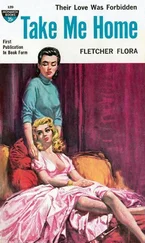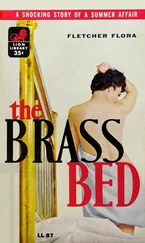Fletcher Flora
Leave Her to Hell
A woman wanted to see me about a job. Her name, she said, was Faith Salem. She lived, she said, in a certain apartment in a certain apartment building, and she told me the number of the apartment and the floor it was on and the name and the address of the building it was in. She said she wanted me to come there and see her at three o’clock that afternoon the same day she called on the telephone. I went and saw her, and it was three o’clock when I got there.
The door was opened by a maid with a face like half a walnut. You may think it’s impossible for a face to look like half a walnut, and I suppose it is, if you want to be literal. But half a walnut is, nevertheless, all I can think of as a comparison when I think of the face of this maid. She wasn’t young, and she probably wasn’t old. She was, as they say, of an indeterminate age. Her eyes smiled, but not her lips; and she nodded her head three times as if she had checked me swiftly on three salient points and was satisfied on every one. This gave me confidence.
“I’m Percy Hand,” I said. “I have an appointment with Miss Salem.”
“This way,” she said.
Following her out of a vestibule, I waded through a couple acres of thick wool pile in crossing two wide rooms. Then I crossed a third room with another acre of black-and-white tile that made me feel, by contrast, as if I were taking steps a yard high; and finally I got out onto a terrace in the sunlight, and Faith Salem got up off her stomach and faced me. She had been lying on a soft pad covered with bright yellow material that might have been silk or nylon or something, and she was wearing in a couple of places a very little bit of another material that was just as shining and soft and might have been the same kind, except that it was white instead of yellow. Sunbathing was what she was doing, and I was glad. Her skin was firm and golden brown, giving the impression of consistency all over, and I was willing to bet that the little bit of white in a couple of places was only a concession to present company. Nine times out of ten, when someone tries to describe a woman who is fairly tall and has a slim and pliant and beautiful body, he will say that she is willowy, and that’s what I say. I say that Faith Salem was willowy. I also say that her hair was almost the identical color of the rest of her. This seemed somehow too perfect to have been accomplished by design, but it may have been. You had to look at her face for a long time before you became aware that she was certainly a number of years older than you’d thought at first she was.
“Mr. Hand has arrived, Miss Faith,” the maid said.
“Thank you, Maria,” Faith Salem said.
I stepped twice, and she stepped twice, and we met and shook hands. Her grip was firm. I liked the way her fingers took hold of my fingers and held them and were in no hurry to drop them.
“Thank you for coming, Mr. Hand,” she said. “You must excuse me for receiving you this way, but the sun is on this terrace for only a short while each afternoon, and I didn’t want to miss any of it.”
“I’d have been sorry to miss it myself,” I said.
She smiled gravely, getting my meaning, and then released my fingers and walked over to a yellow chaise lounge on which a white hip-length coat had been left lying. She put on the coat and moved to a wrought-iron and glass table where there was a single tall tumbler with alternating red and yellow stripes. The tumbler was empty. Holding it against the light, she stared through it wistfully as if regretting its emptiness, and I watched her do this with pleasure and no regrets whatever. There is a kind of legerdemain about a short coat over something shorter. It creates the illusion, even when you have evidence to the contrary, that it’s all there is — there isn’t any more.
“I like you, Mr. Hand,” she said. “I like your looks.”
“Thanks. I like yours too.”
“Would you care for a drink?”
“Why not? Its a warm day.”
“I had a gin and tonic before you came. Do you drink gin and tonic?”
“When it’s offered. A gin and tonic would be fine.”
She set the red and yellow tumbler on the glass top of the table and turned slightly in the direction of the entrance to the black-and-white tiled room.
“Gin and tonic, Maria,” she said.
I had thought that the indeterminate maid with a face like half a walnut had gone away, and I felt a slight shock of surprise to discover that she had been standing all the while behind me. Now she nodded three times exactly, a repetition of the gesture she had made at the door, and backed away into the apartment and out of sight. Faith Salem sat down in a low wicker chair and crossed her feet at the ankles and stared at her long golden legs. I stared at them too.
“Please sit down, Mr. Hand,” she said. “Maria will bring the gin and tonics in a moment. In the meanwhile, if you like, I can begin explaining why I asked you to come here.”
“I’d appreciate it.” I folded myself into her chair’s mate, “I’ve been wondering, of course.”
“Naturally.” The full lower lip protruded a little, giving her face a suggestion of darkness and brooding. “Let me begin by asking a question. Do you know Graham Markley?”
“Not personally. Like everyone else who reads the papers, I know something about him. Quondam boy-wonder of finance. No boy any longer. If he’s still a wonder, he doesn’t work at it quite so hard. From reports, he works harder nowadays at spending some of what he’s made. Unless, of course, there’s another Graham Markley.”
“He’s the one. Graham and I have an understanding.”
There was, before the last word, a barely perceptible hesitation that gave to her statement a subtle and significant shading. She had explained in a breath, or in the briefest holding of a breath, the acres of pile and tile in this lavish stone and steel tower with terraces that caught the afternoon sun for at least a little while. Delicately, she had told me who paid the rent.
“That’s nice,” I said. “Congratulations.”
“It’s entirely informal at present, but it may not remain so. He’s asked me to marry him. Not immediately, which is impossible, but eventually.”
“That’ll be even better. Or will it?”
“It will. A certain amount of security attaches to marriage. There are certain compensations if the marriage fails.” She smiled slowly, the smile beginning and growing and forcing from her face the dark and almost petulant expression of brooding. And in her eyes, which were brown, there was instantly a gleam of cynical good humor which was the effect, as it turned out, of a kind of casual compatibility she had developed with herself. “I haven’t always had the good things that money buys, Mr. Hand, but I’ve learned from experience to live with them naturally. I don’t think I would care to live with less. With these good things that money buys, I’m perfectly willing to accept my share of the bad things that money seems invariably to entail. Is my position clear?”
“Yes, it is,” I said. “It couldn’t be clearer.”
At that moment, Maria returned with a pair of gin and tonics in red and yellow glasses on a tray. She served one of them to Faith Salem and the other to me, and then she completed the three nods routine and went away again. The three nods, I now realized, was not a gesture of approval but an involuntary reaction to any situation to be handled, my arrival earlier, or any situation already handled, as the serving of the drinks. I drank some of my tonic and liked it. There was a kind of astringency in the faintly bitter taste of the quinine. There was also, I thought now that it had been suggested to me, a kind of astringency in Faith Salem. A faintly bitter quality. A clean and refreshing tautness in her lean and lovely body and in her uncompromised compatibility with herself.
Читать дальше











